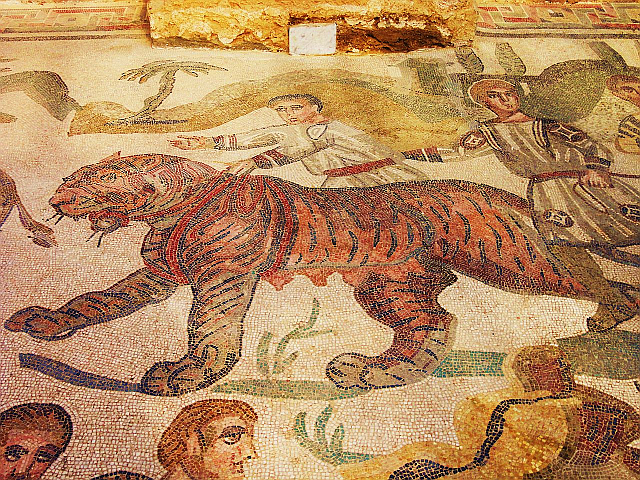If Auerbach's Mimesis tells a story, it's not one that is obvious or simply summarized. His close reading of passages from widely disparate times requires some tenacity to weave into a narrative. The reader at times feels he's been left to do the work of making connections among ganglia that hover on all sides.
At moments, though, Auerbach will yoke expanses of history. Time, instead of flowing uniformly, has long inert periods that undergo sudden seizures that leave imprints on all that comes after. It can be like visiting an archaeological dig, and finding, beneath the structure of one age, that of another. Here's James I. Porter connecting two passages from Mimesis:
Whatever else is involved in that "antagonism" Auerbach speaks of, it's fairly clear that between Jerusalem and Rome there was never a harmonious synthesis, or syncretism. Auerbach sees rupture:
If time permits, I hope to briefly return to Inferno 10 with this in mind.
At moments, though, Auerbach will yoke expanses of history. Time, instead of flowing uniformly, has long inert periods that undergo sudden seizures that leave imprints on all that comes after. It can be like visiting an archaeological dig, and finding, beneath the structure of one age, that of another. Here's James I. Porter connecting two passages from Mimesis:
Christianity could not, however, have succeeded without the lessons it learned from Judaism’s capacity first to conceive and interpret the world historically (based on its notion of universal, “world-historical” events) and then to organize this history into a single coherent transcendental order (Mimesis 17). In doing so, Christianity inherited not merely a religious sensibility, but an ineluctable antagonism: “the antagonism between sensory appearance and meaning, an antagonism which permeates the early, and indeed the whole, Christian view of reality” (Mimesis 49).
Introduction to Time, History, and Literature: Selected Essays of Erich Auerbach, xxvii. Page references work for the edition of Mimesis we've been using.Christianity, which Auerbach sees as the primary organizing principle of history even to our day, has a substratum that is unlike it -- an order that is manifest in Judaism. Judaism is profoundly different, radically other than Christianity, yet the latter, learning its "lessons," was shaped fundamentally by this previous order, which it immediately set about re-interpreting. That reinterpretation was so complete as to devalue, even to deface, the legacy that Christians inherited.
Whatever else is involved in that "antagonism" Auerbach speaks of, it's fairly clear that between Jerusalem and Rome there was never a harmonious synthesis, or syncretism. Auerbach sees rupture:
History for Auerbach is marked by two major ruptures, each constituting moments when vertical, transcendental meaning is shattered in the course of the horizontal, forward propulsion of history, while history is etched in turn with the scars of these traumatic unfoldings, and so acquires a depth of its own. First there is the devaluation (Entwertung) of Judaism through Christianity . . . Porter ibid xxvii.Nearly at the last page of Dante: Poet of the Secular World, Auerbach will see in Christianity the seeds of its own supercession:
With the discovery of individual destiny, modern mimesis discovered the person. It lifted him out of the two-dimensional irreality of a remoteness that was only constructed or imagined and placed him in the realm of history, which is his true home. . . . The immanent realism and historicism that are found in the eschatology of the Comedy flowed back into actual history and filled it with the lifeblood of authentic truth. . . . Radiating out from here, history as such— the life of the human being as this is given and in its earthly character— underwent a vitalization and acquired a new value. (178)It is this "lifeblood of authentic truth" that Auerbach sees in Farinata's commanding presence, even in his tomb; in Cavalcante's grieving; in the power of Dante's poetics to move the reader in ways that draw away from, rather than toward, the remote godhead:
Even the Comedy barely manages to subdue the wild spirits of life within the framework of its eschatology, and one senses how quickly and forcefully these spirits will soon prise themselves loose from their constraints.Somehow it seems that this sanguinaceous theme -- one that runs throughout Auerbach's work -- is always within earshot of Farinata -- as if this wild spirit who rises with the apostrophaic "O Tosco" is always about to break out of the eternal walls of hell itself.
If time permits, I hope to briefly return to Inferno 10 with this in mind.








